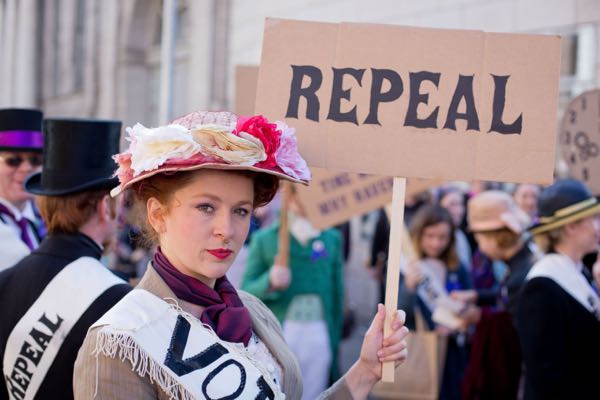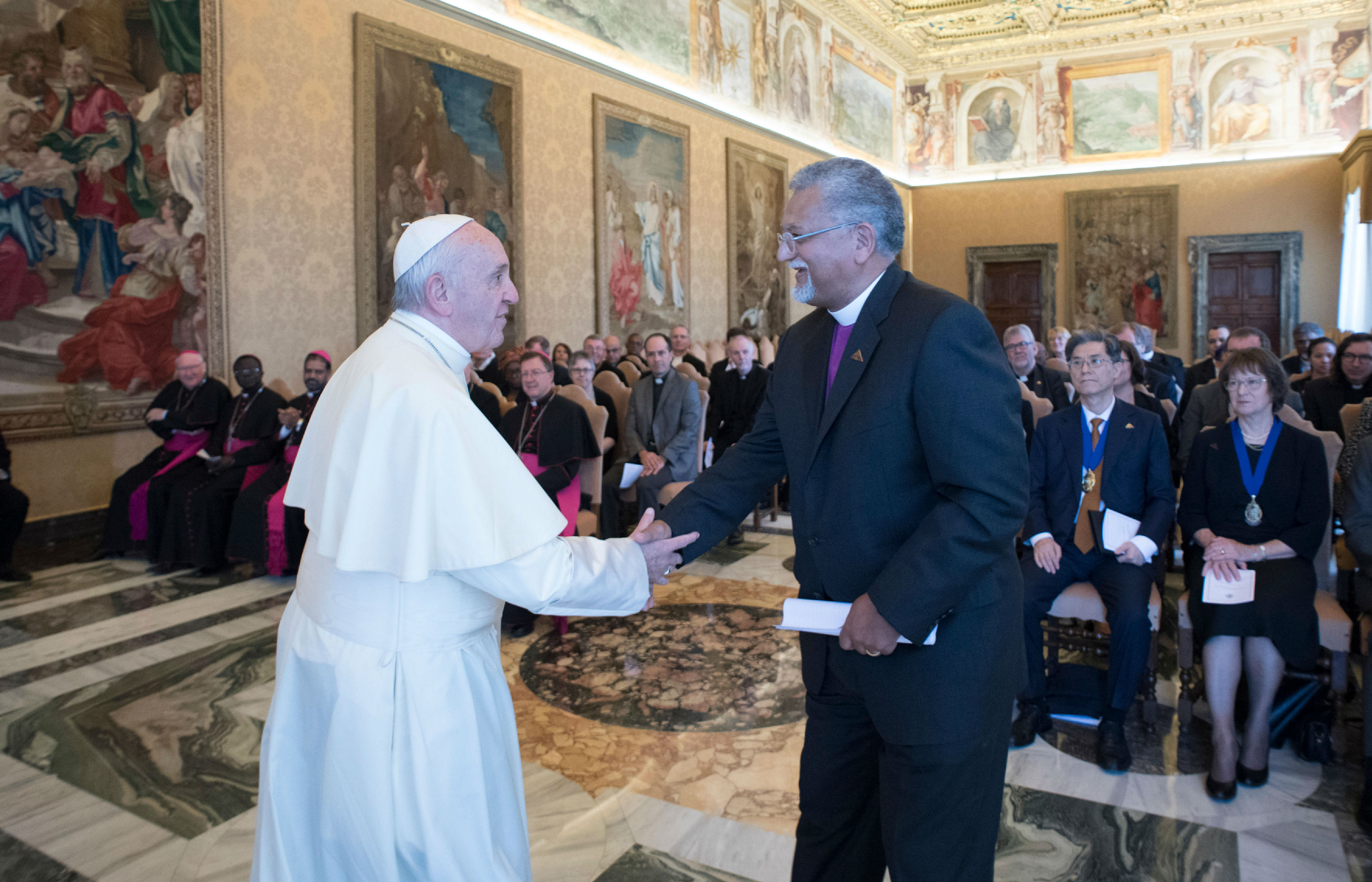From the outset, Catholics and Methodists are Christian denominations that have little in common. Founded in the 18th century by John Wesley, Methodism is renowned as classically ‘low Church’ with less concern on hierarchy and institutional structures and more focus on missionary work. They have traditionally been sceptical of the Church of Rome’s stress on authority and its theology of saints, Mary, and purgatory. Then there are the cultural factors: Catholics drink, Methodists are traditionally teetotal.
But over the last few decades the old caricatures have started to fall away, leading to a discovery that the two denominations share more in common than previously assumed.
Last Thursday, Pope Francis met with Methodist leaders in the Vatican to mark 50 years of Catholic-Methodist dialogue which had ended the “mutual suspicion” and “estrangement” between the churches.
“We are no longer strangers, either in our hearts or in our belonging to the Lord, thanks to the one Baptism that has made us true brothers and sisters,” Francis told them. “We are, and we feel ourselves to be, ‘members of the household of God’.”
John Wesley, the Pope went on, had led many people to “knowledge of Jesus Christ” and this was something to rejoice in and he concluded with a hope that one day Methodists and Catholics will be able to share communion with one another.
From 15-22 October the official commission for dialogue between the World Methodist Council and the Catholic Church met at the Villa Palazzola, just outside of Rome.
The two co-chairs of the dialogue are the Rev. Dr David Chapman, who is Chair
Bedfordshire, Essex and Herfordshire District of the Methodist Church in Britain, and Bishop John Sherrington, Auxiliary in the Archdiocese of Westminster.
Here in a joint interview which took place just after their audience with the Pope, the pair give more detail about the official discussions and how the relationship between denominations and how the relationship is shifting.
Pope Francis says the relationship between Methodists and Catholics has changed from mutual suspicion to friendship. What has happened to the relationship over recent decades?
Rev. Dr David Chapman:
During the past 50 years, since the Second Vatican Council, there has been a time of mutual rediscovery through dialogue, so that our commonalties have emerged. In particular, I would point to our shared emphasis on the Christian life as one of growth in grace. This was one of John Wesley’s great emphases, and in that sense I’d say that John Wesley was someone who wanted to ‘reform the reform’. He was not a Lutheran in the sense of his understanding of the effect of Grace upon the individual, but more aligned with a Catholic theology of the individual growing in Grace. And over the last 50 years we’ve built on that.
Where Methodists are much closer to Roman Catholics in their understanding of the Christian life is that we grow in grace through the means of grace so that we are gradually being transformed. Now, this transformation wouldn’t be understood by Methodists primarily in terms of the sacramental economy, but for Wesley and for Methodists the eucharist has always been a very central means of grace. So that is why I would say Methodists are closer in their theology to Catholics.
Bishop John Sherrington:
“Having been involved in national dialogues and during the last five years a member of the International Roman Catholic Methodist Commission, I have grown in my appreciation of the Methodist Church in terms of its history, its understanding of grace, and knowing that we can share together an understanding of justification. The Methodists agree to the Joint Declaration on the Doctrine of Justification between Lutherans and Catholics [Agreed in 1999] which is very helpful point and from which we can move forward.
In the last dialogue we focused on the Call to Holiness. My understanding has been enriched by Wesley’s understanding of scriptural holiness which resonates with the Second Vatican Council’s call for a deepening of Catholic understanding of the scriptures. I have also been enriched by the understanding of the role of small groups in Methodism where individual Christians call each other to account. There is a parallel to what has happened historically in monasteries and perhaps in what happens in some small communities. Together, we can share that understanding of social holiness which was so central to John Wesley. Also I see the resonances with Catholic Social Teaching and therefore that we share in a common mission, particularly towards those who are poor and who are on the margins.
The Pope has talked about Christians acting as if they are already united. How significant is that?
Rev. Dr David Chapman:
For Methodists, Pope Francis is a great encouraging figure because we look at his own personal lifestyle, his humility as Pope, his preferential concern for the poor. All this resonates with the traditional Methodist concern for justice. And his encouragement to engage in shared mission is something we respond to very warmly. We value that sense of being accepted as brothers and sisters in Christ at a very deep level.
Bishop John Sherrington:
One Bishop commented recently: “Pope Francis has been sent to shake us up.” He reminds us of the importance of prayer and our common mission with other Christians. He is saying: we are called to walk together and work together locally. While we recognise that we have significant differences and disagreements, how are we going to pray together and work together for the good of others. During this current dialogue I have heard the voices of Methodists and Catholics from the African continent, from India, and from Asian countries. In countries where they are a small minority, Christians must work together as a leaven in their communities.
When I was based in Hertfordshire, in that part of the Diocese of Westminster, there was a lot of ecumenical work together in local projects.
Did you have any misconceptions about one another’s denominations which have changed since you became involved in this dialogue?
Bishop John Sherrington:
Initially at the level of theological understanding, I thought Methodists were more ‘reformed’ than they actually are. In the last dialogue we talked about the communion of saints and while discussing the difficult question of purgatory - a state between death and seeing God face to face - I found an openness to something Pope Benedict had described in his letter ’The Hope that Saves (Spe Salve)’ in terms of a more relational understanding of purification. I began to appreciate there were more nuances in the theology of the Methodists than I had first appreciated.
Rev Dr. David Chapman:
I have come to appreciate that the way Catholic theology is articulated is very nuanced. Some of the criticisms made against it by non-Catholics, when you examine them in detail, turn out to be based on a misunderstanding of what Catholic teaching is. In my own sharing of worship with Catholics through attending Mass as part of the dialogue - always obeying the respective disciplines of our churches - I’ve come to appreciate much more the communion of saints. Of course, in our Methodist eucharistic prayers we affirm our belief in the communion of saints. For Catholics, however, the communion of saints becomes a much more lived experience through mentioning the saints in the liturgy and by celebrating feast days. There is no reason why Methodists couldn't re-discover this as well so that the communion of saints becomes a lived experience for us.
How far away are Methodists and Catholics from sharing communion?
Bishop John Sherrington:
Today, celebrating Mass at the Tomb of St Peter, I felt very keenly the pain that divides us because we cannot share Holy Communion. This is felt deeply by both Methodists and Catholics. I think the challenges for ecumenism today are deepened by the difficult questions of Holy Order, priesthood, ministry and in particular the ordination of women in the Methodist experience. We are on a pilgrimage and we rely on God’s grace to walk together carrying the pain of the cross.
Rev Dr. David Chapman:
The dialogue is step by step: at each step recognising that where we are currently is not where we want to be eventually, joyfully affirming what has been achieved but not claiming more than is justified. We are in this dialogue for the long run. The painstaking dialogue and the changing of relationships on the ground will move things forward towards our eventual goal of unity. We don’t want to pretend there aren’t significant obstacles because there are.
Bishop John Sherrington:
The audience with the Holy Father is a remarkable sign of the growth of understanding. 50 years ago I don’t think it would have happened.
Some people might see the differences between Methodists and Catholics as cultural. Low Church vs High Church. Or: Catholics drink, Methodists don’t. Is this a factor?
Rev. Dr David Chapman:
I think that is a caricature but there is some truth in it. For most Methodists, their usual style of worship is a fairly simple service of the word. But when Catholics happen to attend a Methodist celebration of the eucharist they are often not able to see what the differences are in the eucharistic prayer. So there is some liturgical similarity and convergence.
In terms of personal lifestyle, there are fewer Methodists who are total abstainers than there used to be, in fact I’ve met Catholics who say “I’ve never met a Methodist who is an abstainer.”
Bishop John Sherrington:
Pope Francis challenges us to a simple lifestyle. He invites us to accept the gifts of the earth and rejoice in them but to be moderate in their use. Methodists embody that understanding in terms of a humble use of material resources and a generosity towards others.
PICTURE: Pope Francis greets Ivan Abrahams, general secretary of the World Methodist Council, during an audience at the Vatican 19 October Members of the World Methodist Council were in Rome to commemorate the 50th anniversary of the formation of the Joint International Methodist-Catholic Dialogue Commission ©CNS



 Loading ...
Loading ...